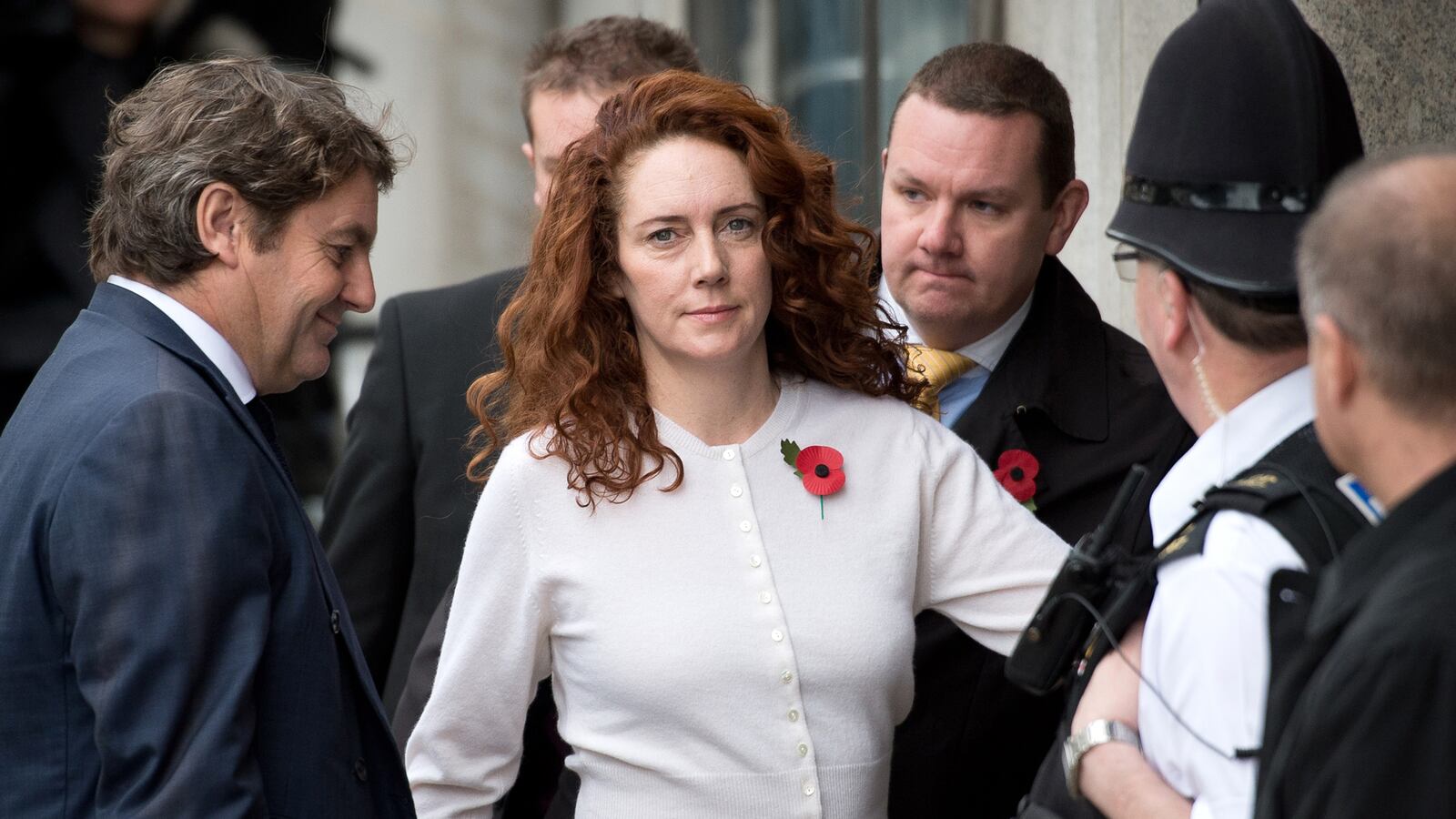The first month of the phone hacking trial at the Old Bailey in Central London has heard an extraordinary account of alleged malpractice, duplicity and illegality at the heart of Rupert Murdoch’s biggest selling newspaper, the now defunct News of the World tabloid. The prosecution case against Rebekah Brooks, Andy Coulson and six others, all of whom deny the charges, resumes on Thursday. Here is everything we have learnt so far.

The Devil is in the Metadata
In British trials, there are usually a number of admissions or ‘agreed facts’, uncontested by either side. In the hacking trial, most of the evidence against private investigator Glenn Mulcaire, who has already pleaded guilty a second time to phone hacking, comes into this category. The police investigation has recovered huge tracts of data about calls and texts from his various mobile numbers and landlines, incidentally just the sort of information the NSA is tracking. He was convicted of hacking the phones of royal aides in 2006 and pleaded guilty to subsequent charges last month. The metadata reveals hundreds of alleged voicemail hacks of a variety of victims, using ingenious methods, including jamming a cell phone to get into its voicemail, resetting the PIN code by pretending to be an engineer, or procuring a direct line to the voicemail.
But it wasn’t just Mulcaire. Though the police could only obtain about nine months of News International’s phone records, from 2005-6, they have identified nearly 700 calls from the offices of News Corp’s London subsidiary which are agreed by both sides to be ‘hacks’. On one day alone in 2006, a News International landline made 24 hacking calls to royal aides and rival journalists. An aide to Princes William and Harry, Jamie Lowther Pinkerton, was hacked 416 times from the Wapping office.
Follow the Money
The second biggest source of prosecution evidence comes from billing and invoice data, showing Mulcaire invoicing News of the World for projects such as ‘Milly Dowler’ (a murdered teenager)—or an ‘assist’ on ‘John Prescott’, the former deputy prime minister. The various billings suggest Mulcaire was paid around $700,000 over a five-year period , though an email recovered from News International’s top legal adviser, Tom Crone, relaying Rebekah Brooks’ discussions with police officers in 2006, suggest the amount was nearer $1.4 million, the jury heard.
A second private investigator, Andrew Gadd, told the court he’d been paid about $500,000 over six years by News of the World to trace people’s home addresses and company records. At least two more private investigators have been reported to have been on the newspaper’s payroll. Nice work if you can get it.
Old Emails will Embarrass You
The third big source of the prosecution evidence has come from emails, some of which have already been produced in court. Messages have been recovered from the private computers of Mulcaire; the former royal reporter Clive Goodman, who was also convicted of phone hacking in 2007; lawyers working on a previous wrongful dismissal case; and one of the laptops of Rebekah Brooks which, the jury heard, contained an unsent love letter to Andy Coulson.
By far, the largest source of email data has come from News International, the British arm of Murdoch’s News Corp empire. The jury has heard that no emails were archived until 2005 but over 93 million emails from the company had been recovered by police. However, among the admissions agreed upon by all sides in the case is that over five million emails had been permanently ‘purged’ from the system dating from 2007 to 2010. In August 2010, Brooks replied to an IT department query about deleting everything up until that year: “Yes to Jan 2010. Clean sweep.” That email survived.
Trust a Lawyer
There are at least 20 barristers attending Court 12 (barristers are an elite cadre of lawyers allowed to represent clients in Britain’s criminal courts). As Justice Saunders told the jury at the opening in late October: “Not only are the defendants on trial, but British justice is on trial.”
Lawyers also figure in the evidence so far. Emails produced by the prosecution seem to show that in November 2006, when his royal reporter Goodman was facing phone hacking charges, Andy Coulson, then editor of News of the World, emailed News International’s top legal adviser, Tom Crone, to get hold of the 2000-page prosecution case from Goodman’s lawyer. Crone then allegedly wrote to Goodman’s lawyer, Henri Brandman asking to see the papers and apologizing for the ‘photocopying’ nightmare. The jury were also told by the prosecutor that police recovered voicemails left by former Labour home secretary, David Blunkett, from Crone’s safe at News International.
Don’t Trust Other Papers
One of the ‘admissions’ or ‘agreed facts’ from both sides is that a ‘private wire line’—a dedicated number used only by News International staff—was used to regularly hack the phones of two rival journalists from the Mail of Sunday while they were both chasing rumour of an affair involving the deputy prime minister, John Prescott.
Meanwhile, the News of the World went to extraordinary lengths to prevent rivals from getting their stories. As the former night editor Harry Scott explained, the old Wapping offices had a secret windowless room where picture editors, subs, and journalists would file a really sensitive story. The weekly tabloid would even produce a fake, spoof ‘street edition’ on a Saturday night to prevent other Sunday papers from getting wind of a scandal. On more than one occasion, they accidentally printed the real story on the street edition, and published the spoof on the Sunday.
Don’t Trust Your Colleagues
The tapes are running. Counsel for both Brooks and Coulson have claimed that the two former News of the World editors were both personally hacked by Mulcaire during the six years when he was working for the paper. The jury even heard a recording of Mulcaire hacking the voicemail of a Labour special advisor, and listening to a message left by his own boss, Andy Coulson. He accidentally deleted it and exclaimed: “Oh Fuck.”
But last week the jury heard the hacks of News International staff didn’t just come from Mulcaire. A News International landline was used to hack the mobile phone of Coulson’s deputy editor, Neil Wallis. Meanwhile, the jury also heard a tap recording that Clive Goodman made after he was arrested for phone hacking in 2006. Goodman apparently elicited the promise from Coulson, “my absolute intention is to be able to say at the end of this that you know we are going to continue to employ you.” Goodman was sacked after his first sentencing in 2007.
It’s Personal
The timeline of ‘agreed facts’ over phone hacking show that the targets included politicians, sport stars, celebrities, their friends and family, mostly when they were in the news, or suspected of affairs or illicit sexual liaisons. In the case of Blunkett, caught in that taped conversation with Coulson, he pointed out that he wasn’t having an affair—he was divorced. In the case of his successor, Charles Clarke, allegedly approached by Sun political editor Trevor Kavanagh over a liaison with his special advisor Hannah Pawlby, the story was wrong and there was no affair taking place. At the same time, the prosecution allege that Brooks, then married to actor Ross Kemp, was having an affair with her former deputy Andy Coulson.
It’s Just Business
The jury heard that Brooks met Coulson at a Mayfair hotel only a week before he resigned as prime minister David Cameron’s press supremo. In January 2011, Brooks allegedly emailed her PA, Cheryl Carter, cc’ed to Coulson, asking her to find a hotel “somewhere discreet” because “I need to see Andy.” Carter suggested the “quiet and discreet” Halkin hotel and Coulson replied: “Fine with me, Can we say 7.45.”
However, according to a close friend of Cameron’s, Dom Loehnis, who testified that he sat next to the then CEO of News International at private birthday party for the prime minister in October 2010, Brooks was already claiming that Coulson’s days as chief press spokesman at Number Ten were numbered. When Loehnis asked Brooks about his future, he told the court that she “said she wasn’t sure if he would survive it as she felt that the story was not going away.”
The trial continues.






